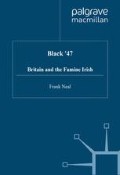Abstract
Clearly, the term ‘cost’ can have various connotations. Importantly, with regard to the famine immigration, there was the cost to the recipient towns of social disruption, deteriorating housing conditions and, in many instances in the north of England, bad inter-communal relations. Such social costs are difficult, though not impossible, to assess. A relatively easy cost to measure is the financial cost of providing relief and medical aid. The issue to be addressed in this chapter is that of the financial cost of the famine immigration to those British towns receiving the refugees. In particular, how large was that cost? What was the incidence of the taxation or, in other words, who paid? Did the cost have a deleterious effect on business? However, before attempting such analysis, the perceptions regarding such matters on the part of contemporary observers and administrators will first be established in order to see if their fears matched the reality. This is important because the resentment over perceived financial burdens influenced attitudes towards the Irish refugees. Then in section III we examine the levels of expenditure on the relief of the Irish in particular towns and the cost of the famine Irish in particular. The expenditure, as a rate per pound is then estimated in section IV. We conclude with an assessement of the effects of this tax burden.
Access this chapter
Tax calculation will be finalised at checkout
Purchases are for personal use only
Preview
Unable to display preview. Download preview PDF.
Notes and References
1 Newcastle Journal, 2 Jan 1847.
Newcastle Journal, 1 May 1847.
Halifax Guardian, 20 February 1847.
Halifax Guardian, 13 May 1847.
5 London Times, 16 February 1847.
Bristol Gazette and Public Advertiser, 18 March 1847.
PRO/MH12/Stockport Union /805B/1847. Letter from Henry Coppock, clerk to the Stockport Union, to Poor Law Commissioners, dated 11 January 1847. …’very great destitution does exist in some districts and especially amongst that class of inhabitant who are of Irish origin..’ The Poor Law Commissioners wrote to the Stockport Guardians 20 January, agreeing to the appointment of an extra relieving of ficer. ‘… in consequence of the great destitution which exists in the Stockport district owing to the influx of Irish paupers..’ See MH12/Stockport Union/1141/805B/1847. Letter dated 20 January 1847.
PRO/MH12/Ashton-under-Lyne Union/5415/23418/1847. Letter from E.Turner and J.Tipping to Poor Law Commissioners, dated 15 December 1847.
PRO/MH12/Ashton under Lyne Union/5415/1847. Letter from Poor Law Commissioners to the Ashton Guardians, 17 February 1847.
PRO/MI-112/Gateshead Union/3069/1847. Letter from William Rowntree, clerk to the Union, to Poor Law Commissioners, dated 4 September 1847.
PRO/NIH12/Gateshead Union/3069/1847 Letter from William Rowntree to Poor Law Commissioners, 26 September 1847.
PRO/MH12/Newport Union/8089/1847. Letter from William Brown and James Hawkings, Medical of ficers, to Newport Guardians, dated 3 April 1847.
PRO/MH12/Prescot Union/6095/1847–49. Letter from John Heyes to Poor Law Commissioners, dated 11 November 1847.
SC (1847) Minutes of Evidence. E. Rushton, q.4328–4332, p.54.
Liverpool Mercury, 7 January 1848. Report on the meeting of the Select Vestry held 4 January 1848.
Liverpool Journal, 29 January 1848.
The 7inte.s, 26 July 1848.
Liverpool Tintes, 30 November 1848. Report on the meeting of the Select Vestry held 28 November 1848.
Irish Poor (1836) Evidence of Mr Rose, Visiting Overseer of Manchester Township, p.54.
(S.C. 1847) Minutes of Evidence, E.Rushton, q. 4339–4355.
During 1848 there were a number of disputes between dock porters and the stevedore companies and it was variously claimed that untrained Irish were being taken on.
Irish Poor (1849)
Manchester Guardian 25 October 1851, Report on the meeting of the Manchester township Poor Law Guardians.
Strathclyde. Minutes of the Parochial Board of Barony, held on 12 September 1848.
Author information
Authors and Affiliations
Copyright information
© 1998 Frank Neal
About this chapter
Cite this chapter
Neal, F. (1998). The Cost of the Famine Immigration. In: Black ’47. Palgrave Macmillan, London. https://doi.org/10.1057/9780230372658_9
Download citation
DOI: https://doi.org/10.1057/9780230372658_9
Publisher Name: Palgrave Macmillan, London
Print ISBN: 978-1-349-39833-1
Online ISBN: 978-0-230-37265-8
eBook Packages: Palgrave History CollectionHistory (R0)

